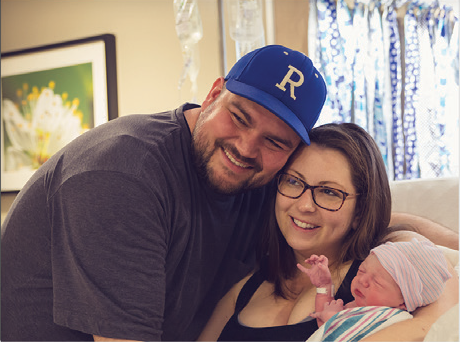What to Expect the First 24 Hours Postpartum

by Christa Melnyk Hines
If you’re on the homestretch of your pregnancy, you’re probably anxiously awaiting the moment when you finally get to hold your newborn in your arms. But what should you expect in the whirlwind of minutes and hours following the much-anticipated arrival of your baby?
The first five minutes.
During the first minute of life, healthcare providers will conduct an Apgar exam to evaluate your baby’s heart rate, respiratory rate, muscle tone, cry, reflexes and skin color. The screening will be repeated at five minutes after birth.
“The Apgar system helps us know if a baby is adapting to this huge transition from in-utero to life on the outside,” says ob/gyn Erin McNulty, MD.
A normal Apgar score ranges between 7 and 10. A score of 4 to 6 may mean that the baby requires oxygen and additional monitoring. Scores 3 and below demand emergency medical intervention.
Soon after delivery, babies receive Erythromycin eye ointment to prevent rare, but serious eye infections that can be passed from mom to baby during delivery. Newborns also receive Vitamin K, a vitamin that helps with blood clotting. Because they don’t produce enough of the vitamin on their own just yet, lack of the supplement puts infants at risk for anemia, excessive jaundice, or damage to internal organs, including the brain.
Meanwhile, if you’ve had a vaginal delivery, your ob/gyn team will oversee the delivery of the placenta and repair any tears to the perineum.
Many hospitals also try to ensure mom and baby get skin-to-skin bonding time in the first few minutes post delivery, even if only for a few minutes in the operating room following a c-section.
The first hour.
If you require a c-section, you’ll spend the first hour postpartum in the operating room where the OB team will suture the uterus and the abdominal skin before transferring you to the recovery room.
Your baby will be most alert during the hour following delivery. You may be pleasantly surprised at how your newborn turns toward your voice and instinctively reaches to nurse.
“If you place a baby skin-to-skin on mom’s belly or chest, even right after delivery, the baby can usually get itself up to the breast to nurse,” says Lisa Cavin-Wainscott, APRN, clinical nurse specialist.
The first feeding will stimulate breast milk production and help the uterus contract, which can prevent excessive bleeding.
Don’t expect you or your baby to get the hang of breastfeeding right away.
“Be patient. It takes time-potentially four to six weeks-for mom and baby to get comfortable,” Cavin-Wainscott says.
Your breastmilk won’t come in for another 48 to 72 hours, but don’t worry. The colostrum that your breasts produce is usually enough for your newborn.
After the first feeding, you and your baby will be tired and ready to sleep. Newborns typically sleep anywhere from 16 to 20 hours per day and may be need to be woken up for a feeding.
“Many new moms are surprised at just how often a newborn needs to eat,” Dr. McNulty says. “Their stomachs are the size of a pea so they are full quickly, but need to eat quickly too.”
Baby will also pass her first stool called meconium, which will be sticky and dark green or black in color.
First four to 12 hours.
These days, most hospitals keep babies with their mothers rather than moving them to a nursery. The time together promotes mother-baby bonding, relaxation and healing. You’ll begin to learn your baby’s cries and recognize feeding cues like hand sucking.
While some hospitals will bathe the baby soon after delivery, others wait until four to 12 hours after birth.
“The baby has a special coating on their skin that actually acts as a moisturizer so we don’t want to give the bath too soon,” says Dawn Cox, MSN, RNC-OB.
A bath immediately postpartum can also stress a newborn because they get cold easily, Cox adds.
You may also notice your baby sneezing, but that doesn’t mean she’s sick.
“Baby may be ‘spitty’ for several hours after birth as they get rid of blood and other fluids that may have been swallowed during the delivery process,” Cavin-Wainscott says.
You may experience physical pain from the delivery and mixed emotions.
“During the first day following delivery, the hormones your body made during pregnancy start to come crashing down and mood swings and changes are the norm,” Dr. McNulty says.
Up to 24 hours.
Your pediatrician or family care physician will conduct a complete physical assessment of your newborn, including blood type, bilirubin level, screening for rare genetic disorders, and a hearing screen.
Labor and delivery nurses, lactation consultants and other healthcare providers, will continue to provide you with support. A financial counselor, social worker and WIC nutrition consultant may also visit to provide resources that you might need before heading home.
Of course, friends and family will be anxious to drop in too.
“I hear many new parents who wish they had slowed down and enjoyed more bonding time with their baby, rather than allowing family members and friends to visit right away,” Dr. McNulty says.
If you’d prefer to wait to see visitors, ask them to visit after the first 24 hours or ask your nurses to advocate for you.
“We are glad to step in and support the patient however we can. We just need to know ahead of time what you would like,” Cox says.
Guests should refrain from visiting if they are sick since babies don’t have well-developed immune systems and are more susceptible to infection. Be aware that different hospitals have different security measures in place to ensure the privacy and safety of their patients.
If possible, advise your friends ahead of time of your hospital’s visitor policies.









